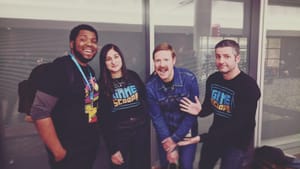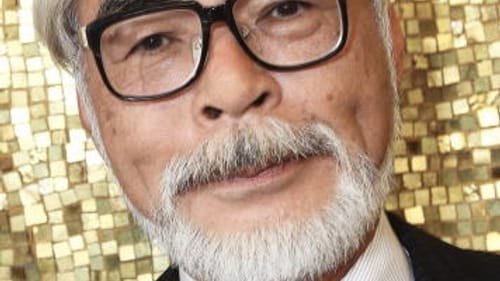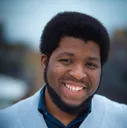Stay in the Loop
BSR publishes on a weekly schedule, with an email newsletter every Wednesday and Thursday morning. There’s no paywall, and subscribing is always free.
Living in the end times—again
While coronavirus strands us at home, revisiting anime fights the loneliness

I spent most of my childhood summers at my grandmom’s house. I rarely went outside to play with the other kids on the block. I remained inside by myself, writing ambitious stories, drawing, and watching what little anime I could find on TV. I’d recorded episodes of Sailor Moon, Dragonball Z, and Voltron, and random movies, on carefully organized VHS tapes. I wasn’t lonely. I was thriving. I chose to be a loner in my days as a shorty, and I made something out of it.
Not-so-lonely summers
But I wasn’t always alone. For one week every summer, my cousins from Virginia Beach would visit. We’d share what anime movies and shows we’d collected—deep cuts scavenged from SyFy, Showtime, and Cartoon Network. After marathon games of hide-and-seek outside and cooling down with boisterous bouts of Mario Kart 64, it was time for anime.
Twenty years ago, one film stood out the most. Princess Mononoke, a Studio Ghibli joint, was one of the first anime flicks to make mainstream buzz in America. It wasn’t our first Ghibli film, but it was the first one I’d fallen in love with—a harrowing tale of humans against nature that heralds what’s happening today.
It was a different world then, and things were about to change forever.
That empty feeling
That was the last summer I spent at my grandmom’s, and one of the last weeks we all spent together. Each time my cousins would leave at the end of the week, I felt empty. I’d cry. I’d have to wait to hear from them on AIM in September when I made my way back home—there was no internet at grandmom’s, and long-distance calls were expensive.
Studio Ghibli films have helped me wrestle with loneliness since childhood. And one of them taught me another lesson this month.
I covered PAX East (a national gaming conference) in Boston a few weeks ago and ended up spending much of my time alone—which was fine, but something felt different this time around. Next, I flew to San Antonio for the Association of Writers and Writing Programs (AWP) conference. In my Lyft after the flight, I learned that San Antonio had just declared a state of emergency, having had their first known case of COVID-19. AWP didn’t cancel the conference, but many panels and vendors did. My co-presenters and I contemplated whether we should go on with our panel. We did, to an impressive crowd, but once it was over, it hit me. That empty feeling.
Is this the end of the world as we know it? Yeah, it is.

Dreams and madness
Whenever this feeling hits, I cue up The Kingdom of Dreams and Madness, a documentary following Hayao Miyazaki, the face of Studio Ghibli. I watched it again on my way home from San Antonio.
It’s a quiet film. The studio that the animators and illustrators work in fills with natural light. There’s a yard that’s modest but green and alive. I can almost smell the pencils and paper, and it ignites the impulse to swipe away eraser shavings. It’s reminiscent of my childhood summers.
This documentary hits hard when it follows the artists to a screening of the film they’d been working on, The Wind Rises. At the end of the screening, Miyazaki stands up, thanks everyone, and sheds tears—the first time he’d ever cried from his own films. I shed a tear, too—I’m reminded how that empty feeling fills with love as a result of collaboration and companionship over shared work.
The Wind Rises was slated to be Miyazaki’s final film, his magnum opus.
Everything is cursed
I was rewatching that documentary just a few weeks ago. In this pandemic, things are drifting, becoming more distant. Less real. More absurd and farfetched. Travels like my recent ones actualize what I do and refill my emotional and professional reservoir. But we’re in a whole new world today. Did the trips to Boston and San Antonio even happen?
“Today, all of humanity’s dreams are cursed somehow,” Miyazaki muses in his kitchen, picking at a bento box and dragging from a cigarette. “Beautiful, yet cursed, dreams. I’m not even talking about wanting to be rich or famous. Screw that… What I mean is, how do we know movies are even worthwhile? If you really think about it, is this not just some grand hobby? ...Most of our world is rubbish. It’s difficult.”
I thought I was prepared for this pandemic. I’d mastered the art of being alone, but loneliness pulls at the threads of your foundations. It rummages darknesses obscured by troves of gigs, tasks, and grand hobbies.
My work masks an unfinished battle with loneliness. Being alone and loneliness are two different things. That’s the lesson I’d learned.
Seeing the future
I still struggle with routine as a work-from-home veteran. Routine is vital, and in the documentary, Miyazaki talks about his own, and how it’s his “life’s foundation” and how he “reads the world” and its changes. Despite that, he’s affected by the world around him.

Miyazaki documented the economic crisis of 2008 with photos he called “snapshots of life as usual.” He says that he “sensed something happened,” that the world was about to shift. The world shifted three years later with the great earthquake and tsunami in Japan. He documented that, too, calling it “The Year It Begins: March 11, 2011.”
“The future is clear. It’s going to fall apart,” he says with a laugh. “I can already see it.” I think many of us feel that sentiment now, in the face of a pandemic.
We must live
The documentary shows producers urging a different ending for The Wind Rises, “a meditative epic about Japan’s traumatic journey into modernity, and a complicated allegory about the innocence, arrogance and culpability of artists.” In an early screenplay draft, the hero was going to die. But Miyazaki eventually came around. One of the last words said to the hero is ikite—a Japanese imperative for live.
Everyone comes together at the film’s wrap party with laughter, tears, and embraces. A panning shot contrasts this, showing the entire studio vacant, quiet, lit by late afternoon light, which is how many offices and studios must look in the current lockdown.
Our world has ended. And in that end, things will shift and play out with wavering uncertainty over a long time. We won’t be the same after this, but this empty feeling is fleeting, just like endings are.
Miyazaki has since come out of retirement and is now working on another film, titled How Do You Live? Maybe that’s the question we’ll be asking after this has passed.
Sign up for our newsletter
All of the week's new articles, all in one place. Sign up for the free weekly BSR newsletters, and don't miss a conversation.

 Kyle V. Hiller
Kyle V. Hiller